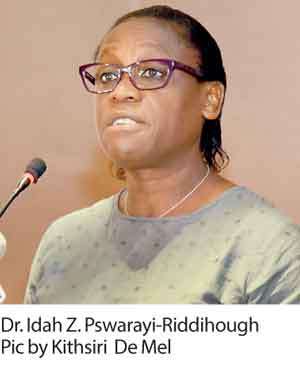29 Jun 2018 - {{hitsCtrl.values.hits}}
 By Shabiya Ali Ahlam
By Shabiya Ali Ahlam
Sri Lanka’s economic growth is expected to rebound this year to around 4.3 percent in the medium term, the World Bank (WB) said yesterday, while giving the island nation a stable outlook provided that the government maintains momentum in its reform agenda.
While Sri Lanka’s economic growth hit a lowest point in 16 years in 2017, largely due to adverse weather conditions, WB expressed confidence in a recovery from a low base to a near mid-single digit level in the medium term— one that will be driven by private consumption and investment.
WB’s latest Sri Lanka Development Update report asserted that natural disasters continue to take their toll on the GDP, while the pace of urgent fiscal reforms have lagged in a challenging political environment.
It also pointed out that despite Sri Lanka recording a fiscal surplus in 2017 for the first time in decades, the country still remains vulnerable due to higher public debt and other structural issues in the economy.
The WB report stated that VAT reforms were among several measures that led to improved revenue collection. Meanwhile, the implementation of the new Inland Revenue Act, which came into effect in April 2018, is expected to structurally increase the tax revenue, it said.
According to WB Senior Economist for Sri Lanka and the Maldives, Ralph Van Doorn, Sri Lanka’s march towards upper middle-income status and more and better jobs hinges on the economy’s competitiveness and its ability to pursue a private investment-tradable sector-led growth model.
Highlighting the challenges posed by domestic political considerations and institutional constraints on implementing policies, Van Doorn said, “A strong political will and support of the bureaucracy could help advance the reform agenda.”
In an effort to transition into the upper middle-income status, the WB stressed that Sri Lanka will have to embrace a new growth model and improve its economy’s competitiveness.
Although the government has begun to implement the extensive and ambitious reforms outlined in Vision 2025, notably phasing out of para-tariffs, simplifying and speeding up procedures for investment, trade and setting up a business, it was asserted that a challenging domestic political environment has already taken a toll, slowing down some reforms and complicating the stable medium-term outlook.
“An impending election cycle only elevates this risk,” the WB cautioned.
It was pointed out that delays in improving tax administration are among the risks the island nation must confront on the fiscal front as successive instances of extreme weather have demonstrated that natural disasters could have an adverse impact on growth, the fiscal budget, the external sector and poverty reduction.
Furthermore, the development lender said the public spending is only expected to increase as the country’s demographic transition advances, putting pressure on pension and healthcare systems.
“To stay on track, Sri Lanka will have to invest in continued fiscal consolidation by further increasing revenue and creating fiscal space for growth, supporting public investment,” the report highlighted.
SL must redefine ‘job’: WB Chief
 The World Bank (WB) yesterday proposed that Sri Lanka must look at redefining its perception of a ‘job’ if it is to overcome the challenges revolving employability, an area the country continues to struggle in terms of productivity.
The World Bank (WB) yesterday proposed that Sri Lanka must look at redefining its perception of a ‘job’ if it is to overcome the challenges revolving employability, an area the country continues to struggle in terms of productivity.
According to WB Country Director for Sri Lanka and Maldives, Dr. Idah Z. Pswarayi-Riddihough, the redefinition is imperative as it can no longer be split into the mere categories of formal versus informal.
Pointing out that future youth cannot afford to aspire for a job that keeps them as a lifer, she said: “We need youth to be at the forefront of creating jobs, some of which we don’t even know will exist in the near future.
“We need them to push policy makers, the private sector and the public sector to lift hurdles on their way, so they can get on with being tomorrow’s employers and innovators.”
While in majority of the countries the young people are said to be focusing on jobs that allow them to innovate and permit risk taking, it was pointed out that this buzz is yet to take root in Sri Lanka despite its lower middle-income status.
“What I hear most from the young here is that they are conditioned by parental ambitions to become doctors or lawyers and then get a job in the public sector. How many can be absorbed into the limited spaces that exist in government? The outcome has been more job seekers than job creators,” Pswarayi-Riddihough noted.
She questioned if the local education system, as it is today, permits the innovation and skills development required for the future.
She suggested that the vocational centers should be upgraded to skill youth on a more continuous basis and stressed the need to explore other working models, as opposed to being physically present at an office.
According to the WB chief, mobility will be the key word for Sri Lanka’s future youth and taking risks will be an endeavor they will be more comfortable with.
Furthermore, they will push the system to adjust accordingly to the new trend (flexible work).
Sri Lanka’s Vision 2025, and also the 2018 budget have highlighted employment and job creation as a priority. Meanwhile WB’s Systematic Country Diagnostic has pointed out that jobs remain a binding constraint to Sri Lanka’s growth. (SAA)
18 Nov 2024 53 minute ago
18 Nov 2024 1 hours ago
18 Nov 2024 1 hours ago
17 Nov 2024 17 Nov 2024
17 Nov 2024 17 Nov 2024